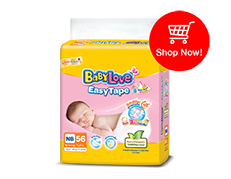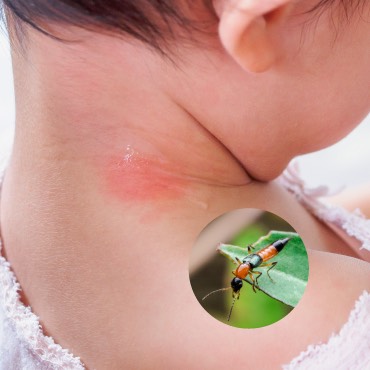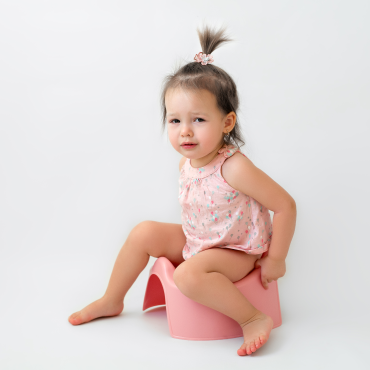For new parents, there are often concerns about symptoms that can occur with newborns. Even the slightest symptom can cause concern because shortly after birth, the infant's body is not fully developed yet. The skin is delicate. The digestive system is not working to its full potential yet. Therefore, there are many common symptoms in newborns.
Parents should help to observe the symptoms and treat them correctly to help maintain the physical health of the baby. Here are tips on how to deal with the common symptoms in newborns.
1. Jaundice
Main Cause
- For most babies, the symptoms of jaundice occur because the baby’s liver functions are not fully developed. Most of the time, when babies are breastfed regularly, the symptoms will naturally decrease.
Characteristics
- Symptoms of jaundice in postpartum is common. Parents will notice the yellowing of the face, whites of the eyes, and torso.
Treatment
- After birth, newborns should be breastfed as soon as possible, averaging at 10-12 times per day to help kickstart the baby’s digestive system, which will get rid of the Billirubin or the yellowing agent.
- The belief that jaundice is a result of not drinking enough water is completely unfounded. There is no need to feed newborns water. They only need breastmilk since it already contains all the water and nutrients a baby requires.
- This symptom will disappear within 2 weeks, except for some cases where they baby may be visibly yellow for 1-2 months. However, if the yellowing increases, accompanied by light colored stool, consult a doctor. It is possible that the cause may be due to other abnormalities and should be properly diagnosed and treated by a specialist.
2. Defecating Too Often
Main Cause
- Newborns who are breastfed, defecate more often than those fed formula milk because breastmilk has many components that promote digestion, such as whey protein that is easy to break down, lactose, Oligosaccharide, which promotes the growth of good bacteria such as lactobacillus. In addition, it also contains the Prostaglandin hormone, which promotes bowel movement. This causes soft stool and easy defecation. This symptom is not diarrhea in any way.
Characteristics
- Newborns defecate more often than usual. At first, it may be up to 8-10 times a day or every time they are fed. The stool is liquid or liquidy, especially in newborns who are breast fed. The color of the stool is usually golden yellow.
Treatment
- The frequency of defecation of the baby will gradually decrease to 1-2 times a day at about age 1-2 months.
- During the first week of life, the amount of defecation is one of the identifying points regarding whether the baby is being adequately fed. If the baby is receiving enough food and nutrients, they tend to defecate more than 4-5 times a day.
- To prevent diaper rash. during this initial period when the baby defecates often, parents should always change the diaper and clean the baby after the defecation to prevent the baby's sensitive skin from becoming irritated.
3. Rashes
Main Cause
- Due the fact that newborn skin is delicate and easily irritated, the skin cells and epidermis are not flexible, so it is sensitive to touch, causing rashes to occur easily.
Characteristics and Treatment
- There are many types of rashes that can occur in newborns.
- Erythema Toxicum: Usually occurs during the first 2-3 days as a temporary condition. It is not harmful and can fade in less than 7 days without any medication.
- Miliaria Rubra: It is a small liquid filled rash, usually found on the forehead and scalp. The rash gradually peels into small scabs. Put newborns in breathable clothing and in an area that is ventilated because the chance of this type of rash occurring raises the more a newborn sweats.
- Seborrheic Dermatitis: Nicknamed “Sebderm”, these rashes are red with yellowish scales along the scalp, eyebrows or areas with high Sebaceous glands. The rash may be more severe during the first 1-2 months and then gradually improve. Symptoms should be diagnosed by a doctor for proper care.
- Diaper Rash (Diaper dermatitis): Caused by irritation or skin contact. When the baby wears wet diapers or dirty diapers for too long. Parents do not need to worry because diaper rash can be easily prevented. Parents should use a diaper with a soft surface suitable for newborns, as well as one that can absorb liquid well. It will help reduce the symptoms. Changing the diaper every time the baby defecates or every 2-3 hours and using the diaper rash ointment every time is enough to protect the baby's sensitive skin from diaper rashes.
4. Heavy Breathing and Cackling Noises
Main Cause
- Newborn babies often breathe heavily or rasp because the baby's airway is still small. In addition, the bronchial cartilage, which will help strengthen the bronchial tube to not flatten while breathing, is not fully developed yet. When the bronchial tube is flattened, the baby’s breathing can sound raspy.
Characteristics
- Sometimes the baby may breathe heavily intermittently, followed by normal breathing, especially when sleeping. If the baby has a comfortable sleep and does not show any difficulty breathing, it is considered normal and not dangerous. The symptoms will naturally disappear.
Treatment
- In addition, in some cases, this symptom may be caused by snot or milk that has come back up into the airway. Cleaning the airway with a saline solution will get rid of these unwanted symptoms.
Source: Dr. Anne – Piyarat Lertbunpong (MD) Pediatrician Specialist From Samitivej Hospital, Sukhumvit / websites www.thaibreastfeeding.org , www.medicarezine.com , www.rakluke.com
Crated At 28/12/2016






















